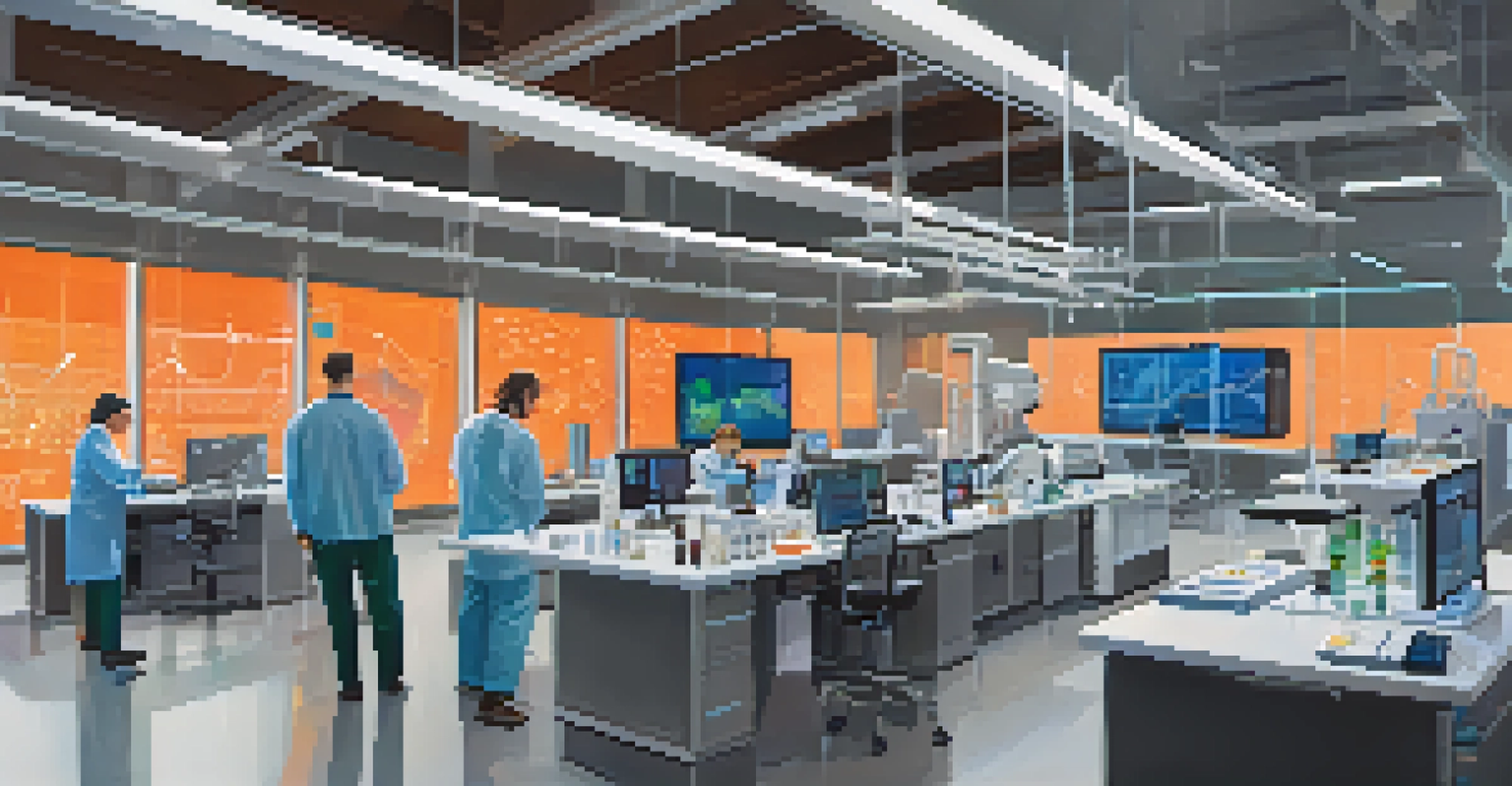Research Collaboration Opportunities in Seattle's Institutions

Overview of Seattle's Research Landscape
Seattle is home to a vibrant research ecosystem, characterized by a diverse array of institutions ranging from universities to biotech firms. The city’s unique blend of academia and industry facilitates a rich environment for collaboration. Major players like the University of Washington and Fred Hutchinson Cancer Research Center lead the way in cutting-edge research and innovation.
Collaboration allows us to know more than we are capable of knowing by ourselves.
This dynamic landscape not only promotes scientific discovery but also fosters partnerships that drive progress across various fields, including health, technology, and environmental sciences. With a strong emphasis on interdisciplinary research, Seattle encourages collaboration among different sectors and institutions. As a result, researchers can leverage shared resources and expertise to tackle complex problems.
Additionally, Seattle's commitment to fostering innovation is evident through numerous initiatives and funding opportunities aimed at promoting collaborative research. For anyone looking to tap into this vibrant ecosystem, understanding the landscape is the first step towards unlocking its potential.
Key Institutions Leading Research Efforts
Among the shining stars in Seattle's research scene is the University of Washington, known for its strong emphasis on collaboration and innovation. With a wide range of research centers and institutes, the university offers ample opportunities for partnerships in fields like medicine, engineering, and environmental science. Researchers can tap into various programs designed to facilitate collaboration between faculty and industry leaders.

Another key institution is the Fred Hutchinson Cancer Research Center, which focuses on cancer research and prevention. The center actively seeks collaborations with other research institutions, biotech companies, and pharmaceutical firms, creating a rich network of expertise. Their commitment to advancing cancer treatment through collaborative research is a testament to the power of partnership.
Seattle's Research Collaboration Hub
Seattle boasts a vibrant research ecosystem where institutions like the University of Washington and Fred Hutchinson Cancer Research Center lead innovative partnerships.
Moreover, institutions like Seattle Children's Hospital and the Allen Institute contribute significantly to the research community. They provide platforms for collaboration, encouraging researchers to work together on projects that can lead to groundbreaking discoveries and advancements.
Research Grants and Funding Opportunities
Funding plays a critical role in facilitating research collaborations, and Seattle offers a variety of grants and funding opportunities designed to encourage partnerships. Numerous federal and state grants are available, often prioritizing collaborative projects that align with regional and national research goals. This financial support can help propel research initiatives and foster innovation.
Innovation is born from the interaction between technology and research, leading to collaborative breakthroughs.
Local organizations, such as the Washington State Life Sciences Discovery Fund, also provide funding specifically for collaborative research efforts. These funds can be pivotal in helping teams bring their ideas from concept to reality, especially in competitive fields like biotechnology and healthcare. By pooling resources, researchers can enhance their chances of securing funding.
Additionally, private foundations and corporate sponsors often look for collaborative projects to invest in, further expanding the funding landscape. Engaging with these funding sources can open doors to new opportunities and partnerships that might not have been possible otherwise.
Networking Events and Conferences
Networking is essential for building collaborative relationships, and Seattle hosts numerous events and conferences throughout the year. These gatherings provide an excellent platform for researchers, industry professionals, and students to connect, share ideas, and explore potential partnerships. Events like the Seattle Innovation Conference attract diverse participants, fostering a vibrant atmosphere for collaboration.
Conferences focused on specific fields, such as the Seattle Biotech Summit, also encourage discussions around collaborative research and innovation. Attendees can engage with thought leaders, participate in workshops, and gain insights into the latest trends and technologies. These connections can lead to fruitful collaborations that advance research efforts.
Funding Drives Collaborative Research
A variety of grants and funding opportunities are available in Seattle, encouraging collaborative projects that align with regional and national research goals.
Moreover, universities and research institutions often host their own events, creating additional opportunities for networking within Seattle's research community. By actively participating in these events, researchers can expand their networks and discover new avenues for collaboration.
Collaborative Research Initiatives and Programs
Several collaborative research initiatives and programs are already making waves in Seattle. For example, the Seattle Translational Tumor Microenvironment Network aims to connect researchers across institutions to better understand cancer treatment. This initiative exemplifies how pooling expertise can lead to significant advancements in research.
Another noteworthy example is the Pacific Northwest Research Institute, which focuses on health-related research and actively encourages collaboration among researchers in the region. Through shared resources and joint projects, these initiatives aim to tackle pressing health challenges and improve patient outcomes. They highlight the importance of collective efforts in achieving impactful results.
Additionally, programs like the Washington Research Foundation provide support for collaborative research projects, ensuring that innovative ideas can flourish. These initiatives not only promote teamwork but also enhance the research capabilities of participating institutions.
Interdisciplinary Collaboration as a Key Trend
Interdisciplinary collaboration is rapidly becoming a hallmark of research in Seattle. By breaking down departmental barriers, researchers from various fields can work together to address complex challenges that require diverse expertise. For instance, combining insights from computer science and biology can lead to breakthroughs in bioinformatics and personalized medicine.
Seattle’s institutions actively encourage interdisciplinary projects, often providing platforms and resources to support these efforts. The ability to bring different perspectives and skill sets together can lead to innovative solutions that would be difficult to achieve within a single discipline. This trend is reshaping the landscape of research in the city.
Interdisciplinary Trends in Research
Interdisciplinary collaboration is becoming a key trend in Seattle, allowing researchers from diverse fields to tackle complex challenges together.
Moreover, interdisciplinary collaboration helps foster a culture of creativity and innovation, as researchers learn from each other's methodologies and approaches. This collaborative spirit not only enhances research outcomes but also prepares students and professionals for the increasingly interconnected nature of today's job market.
The Role of Technology in Facilitating Collaboration
Technology plays a crucial role in facilitating research collaborations, especially in a tech-savvy city like Seattle. Advanced communication tools and collaborative platforms make it easier for researchers to connect, share data, and work together seamlessly, regardless of their physical locations. This connectivity enhances the potential for collaborations, allowing for real-time sharing of ideas and findings.
Moreover, technological advancements in data analysis and cloud computing empower researchers to tackle larger datasets and conduct more complex analyses. This capability is particularly valuable in fields like genomics and epidemiology, where interdisciplinary teams can analyze vast amounts of data collaboratively. The efficiency and speed of technology enable researchers to focus on innovation rather than logistics.

As a result, technology not only streamlines collaboration but also opens up new avenues for research that were previously unimaginable. In Seattle, where technology and research go hand in hand, embracing these tools is essential for fostering impactful collaborations.
Future Trends in Research Collaboration in Seattle
Looking ahead, research collaboration in Seattle is poised for exciting developments. As more institutions recognize the value of partnerships, we can expect an increase in collaborative projects addressing pressing global challenges, such as climate change and public health. This trend reflects a growing understanding that no single institution can tackle these issues alone.
Additionally, the integration of artificial intelligence and machine learning into research processes is likely to enhance collaboration further. These technologies can facilitate better data sharing and analysis, allowing interdisciplinary teams to generate insights at an unprecedented scale. As these tools evolve, they will undoubtedly shape the future of research collaboration in Seattle.
Finally, as the global landscape continues to evolve, Seattle's research community will likely become even more interconnected with international partners. This globalization of research efforts allows for diverse perspectives and expertise, ultimately leading to richer collaborations and more impactful outcomes.